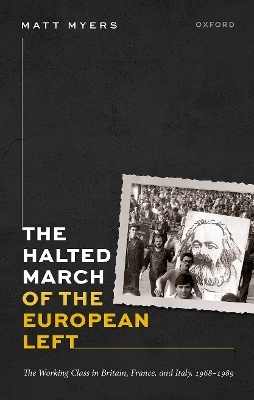
The Halted March of the European Left
The Working Class in Britain, France, and Italy, 1968–1989
Seiten
2025
Oxford University Press (Verlag)
978-0-19-894461-4 (ISBN)
Oxford University Press (Verlag)
978-0-19-894461-4 (ISBN)
- Noch nicht erschienen (ca. Februar 2025)
- Versandkostenfrei
- Auch auf Rechnung
- Artikel merken
The Halted March of the European Left provides a bold reinterpretation of the 1970s. It provides a comparative analysis of the crisis of purpose and identity of the British, French, and Italian left and its sense of both defeat and lost opportunities.
The European left seemed to be in rude health during the 1970s. Never had so many political parties committed to representing the working class been in power simultaneously across the continent. New forms of mobilisation led by female, immigrant, and young wage-earners seemed to reflect the growing strength of the workers' movement rather than its pending obsolescence. Parties and trade unions grew rapidly as a diverse new generation entered the ranks. Why did the left's forward march halt so abruptly?
The Halted March of the European Left shows how the left's defeats after the mid-1970s were not the inevitable result of deindustrialisation or, more precisely, the transition to a globalised and post-Fordist world that abolished the working class as a great historical actor. Choices that were made during a concentrated but decisive historical moment contributed to the left's lost combats. The British, French, and Italian left managed the shift to a new era by marginalising those groups of workers who had invested it with hopes of social and political transformation. Communist, socialist, and social democratic parties helped disempower the new components of the working class in workplaces, in society, in the political system, and successfully disciplined their traditional working-class supporters. The left encountered a crisis of purpose and identity, a sense of both defeat and lost opportunities, and the dissolution of the idea of a community of fate amongst workers. This book provides a comparative analysis of the left's fragmenting relationship with the working class and a “feel” for the culture of three leading industrial countries during a traumatic transition of late twentieth-century history. It concludes that decisions taken by the left during the 1970s contributed to the tragic inversion of the expected outcome of that hopeful decade.
The European left seemed to be in rude health during the 1970s. Never had so many political parties committed to representing the working class been in power simultaneously across the continent. New forms of mobilisation led by female, immigrant, and young wage-earners seemed to reflect the growing strength of the workers' movement rather than its pending obsolescence. Parties and trade unions grew rapidly as a diverse new generation entered the ranks. Why did the left's forward march halt so abruptly?
The Halted March of the European Left shows how the left's defeats after the mid-1970s were not the inevitable result of deindustrialisation or, more precisely, the transition to a globalised and post-Fordist world that abolished the working class as a great historical actor. Choices that were made during a concentrated but decisive historical moment contributed to the left's lost combats. The British, French, and Italian left managed the shift to a new era by marginalising those groups of workers who had invested it with hopes of social and political transformation. Communist, socialist, and social democratic parties helped disempower the new components of the working class in workplaces, in society, in the political system, and successfully disciplined their traditional working-class supporters. The left encountered a crisis of purpose and identity, a sense of both defeat and lost opportunities, and the dissolution of the idea of a community of fate amongst workers. This book provides a comparative analysis of the left's fragmenting relationship with the working class and a “feel” for the culture of three leading industrial countries during a traumatic transition of late twentieth-century history. It concludes that decisions taken by the left during the 1970s contributed to the tragic inversion of the expected outcome of that hopeful decade.
Matt Myers has been educated in Oxford, London, Paris, and Padua. He completed his doctorate at the University of Oxford, held a fellowship at the British School at Rome, and teaches history at Oxford.
| Erscheint lt. Verlag | 6.2.2025 |
|---|---|
| Reihe/Serie | Oxford Historical Monographs |
| Verlagsort | Oxford |
| Sprache | englisch |
| Maße | 138 x 216 mm |
| Themenwelt | Geschichte ► Allgemeine Geschichte ► Neuzeit (bis 1918) |
| Geisteswissenschaften ► Geschichte ► Regional- / Ländergeschichte | |
| Geschichte ► Teilgebiete der Geschichte ► Kulturgeschichte | |
| ISBN-10 | 0-19-894461-6 / 0198944616 |
| ISBN-13 | 978-0-19-894461-4 / 9780198944614 |
| Zustand | Neuware |
| Informationen gemäß Produktsicherheitsverordnung (GPSR) | |
| Haben Sie eine Frage zum Produkt? |
Mehr entdecken
aus dem Bereich
aus dem Bereich
Giordano Bruno - ein ketzerisches Leben
Buch | Hardcover (2024)
C.H.Beck (Verlag)
CHF 41,85
das dramatische 16. Jahrhundert
Buch | Hardcover (2024)
Rowohlt Berlin (Verlag)
CHF 47,60


